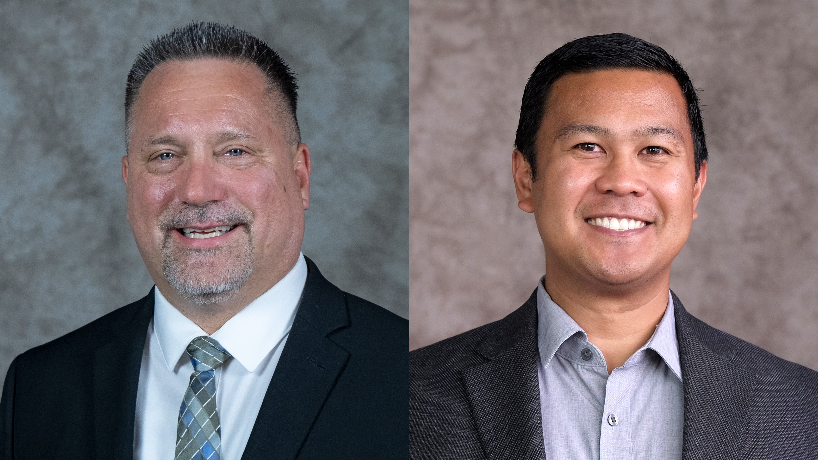
George Zsidisin (left) moderated the Supply Chain and Analytics Department’s webinar “How COVID-19 Is Impacting Supply Chains at Missouri Companies.” Ameren, Bunge and Hub Group were represented at the event. Adriano Udani led a conversation titled “The Impact of COVID-19 on Immigrant and Refugee Communities in St. Louis,” which discussed research opportunities with faculty members across disciplines. (Photos by August Jennewein)
As the novel coronavirus pandemic influences nearly every industry, researchers at the University of Missouri–St. Louis are joining forces to find effective ways to mitigate the virus’s negative effects.
Last week, the Department of Supply Chain and Analytics and the Office of Research Administration hosted Zoom webinars that brought faculty members and local business executives together. Topics included ways to offset supply chain shortages and a discussion of the challenges facing immigrants during COVID-19.
“How COVID-19 Is Impacting Supply Chains at Missouri Companies”
Knowing what you know today, what would you have done differently to prepare for the COVID-19 pandemic?
That’s one of the questions George Zsidisin, the director of the Supply Chain Risk and Resilience Research Institute and a professor of supply chain management, posed to representatives of Ameren, Bunge, Express Scripts and Hub Group on Monday at a virtual event hosted by the institute.
Panelists Ty Lindhorst, director of supply chain operations at Ameren; Brett Caplice, director of North American grains at Bunge; Jaya Subramaniam, senior director of drug sourcing risk management and analytics at Express Scripts; and Christopher Miller, vice president of enterprise optimization at Hub Group, discussed how COVID-19 impacted supply chains in the energy, agricultural, pharmaceutical and transportation industries respectively.
Each panelist spoke for about 10 minutes, describing how the pandemic affected operations, how their organizations responded and what they would have done differently in hindsight.
“The pharma companies – whether they’re raw material suppliers or the final, finished dose – they all have been operating at less than what they usually operate,” Subramaniam said. “They are on an average between 50 to 70 percent of their capacity.”
She cited logistical difficulties due to restrictions on transporting goods between countries and discussed the surge in demand for medicines to treat COVID-19. Express Scripts had plans in place before the pandemic hit and has seen minimal supply chain disruption.
Caplice stated that demand changed quickly across sectors at his company. For instance, sales of soybean oil to the food service industry dropped while sales of the same product to companies manufacturing snack foods rose.
“The total demand pie probably stayed about the same, but it shifted dramatically in where it went,” Caplice said.
Zsidisin pointed out three common themes across the panel: ensuring employees’ safety, offsetting demand volatility and the importance of planning ahead for possible supply chain disruptions.
Click here to watch part one of the webinar.
Click here to watch part two of the webinar.
“The Impact of COVID-19 on Immigrant and Refugee Communities in St. Louis”
Stay-at-home orders created unique challenges for immigrant and refugee populations, including barriers to health care, a lack of resources for remote learning and crowded conditions that made social distancing impossible in camps along the border between the United States and Mexico.
Assistant Professor of Political Science Adriano Udani led Friday’s COVID-19 Research Conversation, a weekly faculty discussion organized by the Office of Research Administration.
Udani stressed that the pandemic is exacerbating challenges immigrants and asylum seekers from Central and South America face every day.
“The suffering that we’re observing right now is not just from the virus,” he said. “It’s really from all forms of violation to their human spirit, to their human rights.”
Access to health care presents a significant challenge. For instance, something as simple as a telehealth appointment may prove difficult.
“We’re telling people to go see their primary care providers, when many undocumented immigrants don’t have primary care providers,” Udani said. “They’ve had to rely on emergency rooms for a very long time. Now we’re sort of putting those people in limbo in terms of giving them mixed messages. I think the kids are also under stress. They have to serve as their family and guardians’ language broker.”
The second half of the webinar consisted of a discussion about potential areas for interdisciplinary research, including the need for more data on the Latinx population, building trust within immigrant communities, designing effective health messaging and examining exploitation and related issues.














